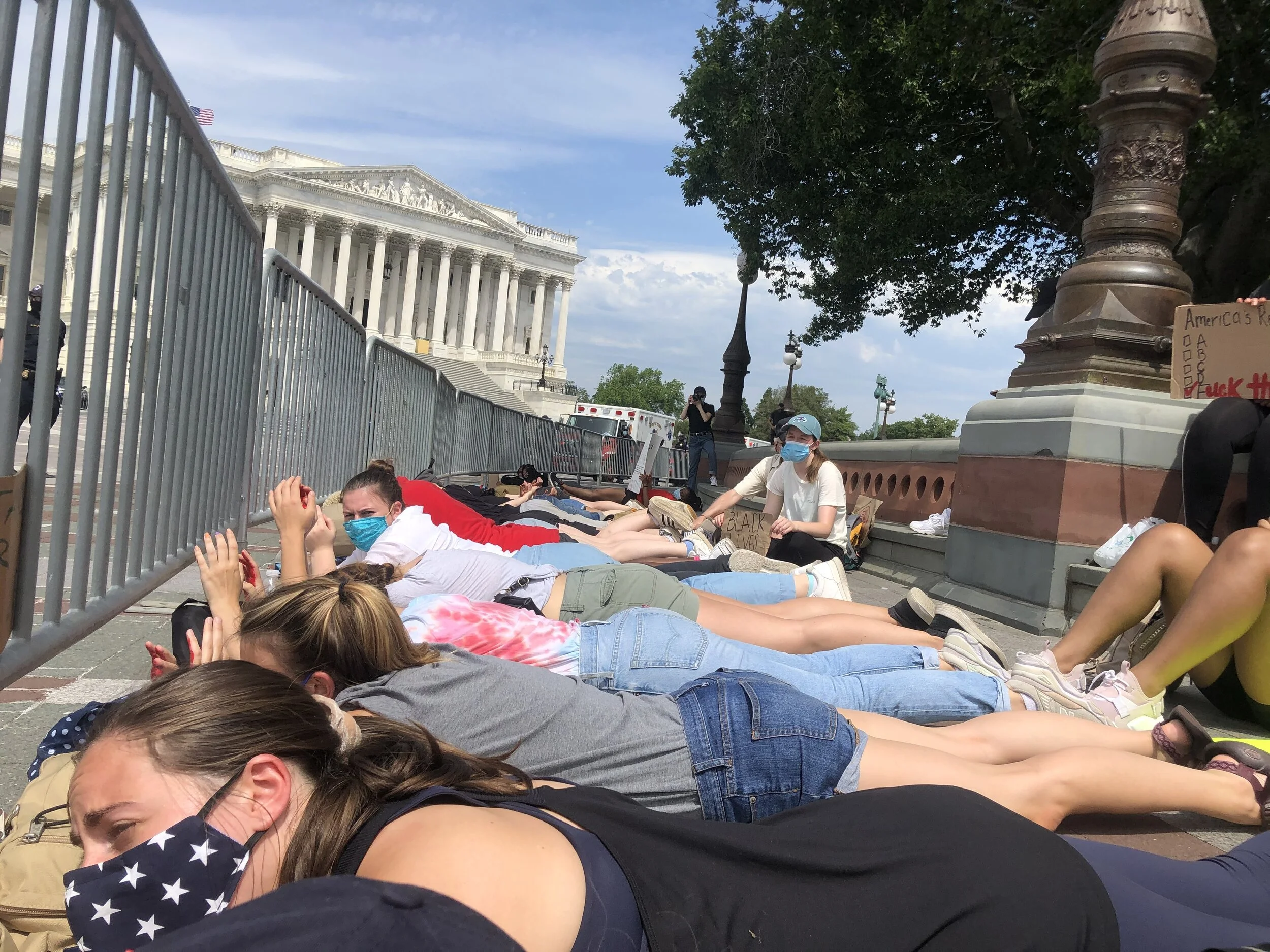photo credit: Marie Sheppard
Annie will facilitate Monday night. She shares:
Dear Friends,
During times like these, I am so grateful for our community where we can come and sit together in silence and also share from our hearts.
As I write this, protests in Washington DC are growing in size every day and similar actions are happening in all 50 states. I know that many of us have been out there in solidarity with the calls for justice, demilitarizing the police, and racial equality. I am guessing this is on the hearts and minds of most of us right now.
My own practice with engaged Buddhist practice (read a talk by Thich Nhat Hanh (Thay) on Engaged Buddhism HERE) grows out of the Fourteen Mindfulness Trainings which I received from Thay in 2009. In the ninth and tenth trainings, we are recommended to do the following:
“We will do our best to speak out about situations of injustice, even when doing so may make difficulties for us or threaten our safety… As members of a spiritual community, we should nonetheless take a clear stand against oppression and injustice. We should strive to change the situation, without taking sides in a conflict.”
In the Five Mindfulness Trainings, the first training recommends:
“Seeing that harmful actions arise from anger, fear, greed, and intolerance, which in turn come from dualistic and discriminative thinking, I will cultivate openness, non-discrimination, and non-attachment to views in order to transform violence, fanaticism, and dogmatism in myself and in the world.”
Because this is a challenging practice, I am always looking for ways to get clarity about how I can act without coming from dualistic and discriminating thinking (“I’m good, They’re bad”). How I can contribute to healing without getting caught by my self-righteousness?
This Monday, to support our deepening understanding of how we might take mindful action in this moment, we will listen to an excerpt from a 2017 talk (full talk HERE) in which Kaira Jewel Lingo (an African-American dharma teacher and former nun in the Plum Village tradition) shares how to take action against injustice and ignorance in a compassionate and mindful way. The Buddhist teacher, James Baraz is also part of this conversation.
The first question we will listen to is:
How do you get beyond the tendency to think we are right and “they” are wrong?
In her response, Kaira Jewel starts by saying:
“I think it’s important to not shy away from action and engagement that you feel is coming from wisdom and from collective wisdom and insight. And, we can mindfully engage and resist and speak out about things, about other people, and it’s not that we do it with the understanding or belief that they are wrong as people, but the ignorance in them is harmful. The violence, the discrimination is harmful and needs to be taken on strongly with fierce compassion.”
She goes on to say:
“I don’t want to eliminate Trump. I want to eliminate… I want to really get to the root of where those views come from to heal them in all of us. Because part of this is it’s not just that these ideas are in the people we oppose, they are in us too. That’s why taking good care of looking where we are coming from before we engage in action. Because we can make the situation worse, we can cause greater separation and we don’t want to do that.”
The second question both Kaira Jewel and James answer is:
How do we response to people who say that being mindful is too passive of an approach for reaching change?
Kaira Jewel begins with:
“We do need to own in those criticisms of mindfulness, there has been…there is truth that in our communities of practice there has been a tendency in our spiritual communities, I would say, towards taking care of ourselves and calming our own minds, and less of an emphasis, in many of our Buddhist communities, on engagement. That’s why what you quoted of Bikkhu Bodhi is so important. We really do need more messages… we need to focus our spiritual communities in how to engage and respond.”
Valerie Brown, another African-American dharma teacher in our tradition, wrote a short piece, related to this topic on How to Fight without Hating. You can read that here.
In her short piece, Valerie suggests we act using these guidelines:
· We are instructed to meet police violence with non-violence.
· We are instructed to meet racist structures and systems with diligence with inner resilience born out of compassionate action.
· We are instructed to meet hatred with an open heart and to cultivate heartfulness because love, compassion, kindness, and peace are bigger than a heart constricted by hate, discrimination and violence.
· This is the skillful action toward radical power and love.
Some questions we might ponder on our own or together:
(1) Where are our actions coming from? Have we done our own work to be fully present? Are we trying to understand the other person, and are we open to other views?
(2) Do we see that the things we hate in the other person are also in us, or are we caught in a superiority complex?
(3) Are we looking to root out ignorance rather than trying to eliminate the other side?
(4) Are we keeping our hearts open as we protest, write letters, or otherwise take action?
I look forward to seeing you on Monday. Please feel free to email me anytime if you have questions or comments. annie@openingheartmindfulness.org.
with much love,
annie
After our meditation period, we will listen to the excerpt, and then have time to share our reflections with each other.

